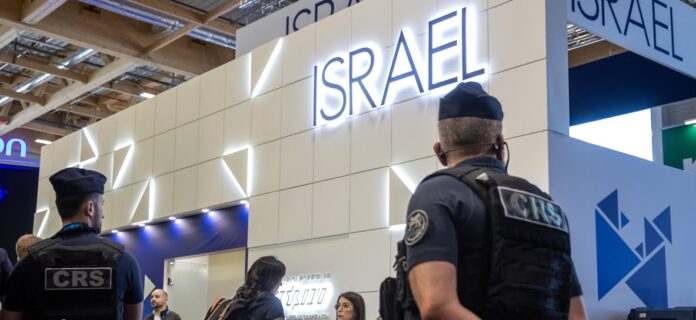The French government orders Israeli defence firms to hide offensive weapons, igniting a diplomatic row.
The Paris Air Show opened under a diplomatic cloud on Monday after French authorities ordered black partition walls erected around Israeli defence exhibitors, barring the display of offensive weaponry amid the ongoing war in Gaza.
The overnight move stunned Israeli companies and triggered a sharp rebuke from Israel’s Defence Ministry, which condemned the action as “ugly and improper,” accusing France of bowing to political pressure under the guise of humanitarian concern.
The makeshift walls now surround several Israeli booths at Le Bourget airport, just north of Paris, effectively sealing them off from other international defence and aerospace exhibitors. French riot police patrolled the aisles near the cordoned area as protesters outside denounced Israeli military operations in Gaza and the international arms trade supporting it.
French Prime Minister François Bayrou defended the decision, citing “extreme tensions” in the Middle East and growing domestic outrage over Israel’s military conduct. “Given the situation in the region, and France’s diplomatic concerns — especially regarding Gaza — we chose not to allow offensive weapons to be displayed by Israeli companies,” he said.
Bayrou added that Israeli firms had been informed in advance of the limitations, and four complied. However, five did not, prompting the erection of the stark black panels. “This is temporary,” he insisted.
The Defence Ministry in Tel Aviv dismissed France’s explanation, saying the last-minute enforcement harmed Israel’s standing. “The French are hiding behind supposedly political considerations to exclude Israeli offensive weapons from an international exhibition — weapons that compete with French industries,” it stated.
Some Israeli exhibitors reacted with dismay. Shlomo Toaff, head of Rafael’s air defence division, said he was unable to enter his company’s display area and was preparing an emergency legal appeal. “These weapons are used in a legal way to protect our people and to free the hostages,” he told the Associated Press. “Anyone who believes in free speech and free business should be outraged.”
Organisers of the air show clarified that decisions on participation rest with the French government. The event, one of the largest of its kind globally, features aerospace giants like Airbus and Lockheed Martin, along with state-backed firms from dozens of countries. Among the most prominent offensive systems on display: France’s own Rafale fighter jets and cruise missiles.
A French official, speaking anonymously, said Israeli firms were informed “weeks ago” of the ban on offensive arms. The partitions, they added, were a last resort after non-compliance.
Tensions flared further when two women scrawled graffiti and an Israeli flag on the barriers surrounding Rafael’s stand, accusing the French government of discrimination. Security swiftly covered the markings with black plastic.
Outside the venue, a small group of activists protested against Israel’s war in Gaza and the nations supplying arms to its military. “The French government’s response is weak,” one demonstrator said, calling for a full boycott.
Bayrou sought to draw a line between Israel’s confrontation with Iran — which he acknowledged posed a serious global threat — and the humanitarian crisis in Gaza. “The situation in Gaza injures and repulses many of our compatriots, including those who are friends of Israel,” he said.
Israel’s military response to Hamas’s 7 October 2023 attacks has left thousands dead and sparked fierce debate worldwide, with critics accusing it of excessive force and deliberate targeting of civilian infrastructure. The recent blocking of humanitarian aid has fuelled further protests in France and elsewhere.
While some Israeli firms may eventually regain access to their booths, Monday’s images — of black walls, riot police, and silenced exhibits — offered a stark symbol of growing international unease with Israel’s wartime posture.
